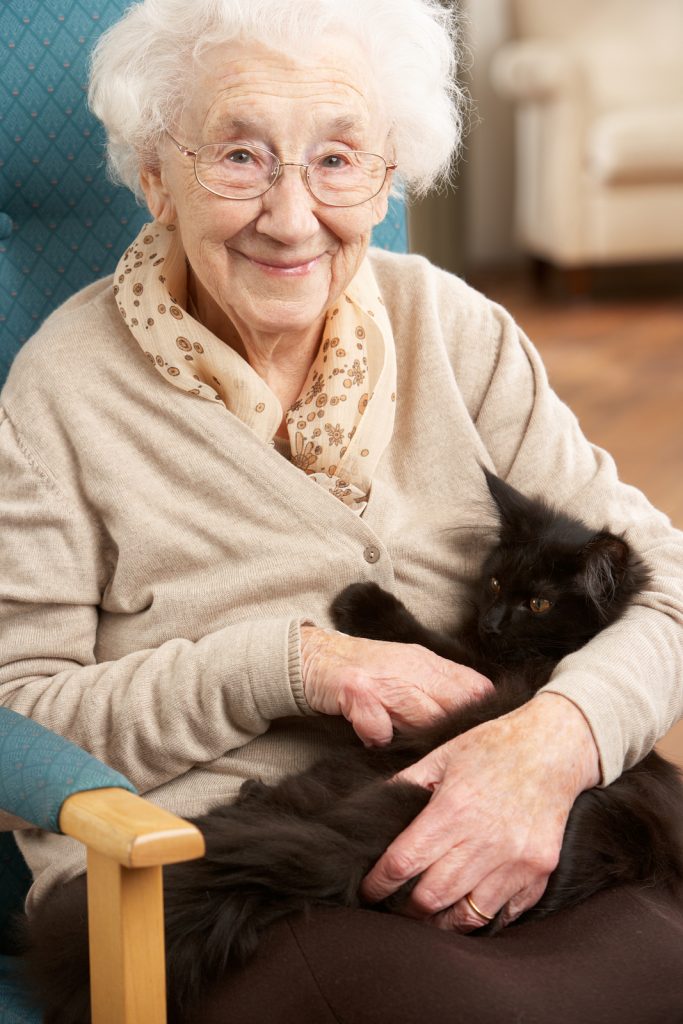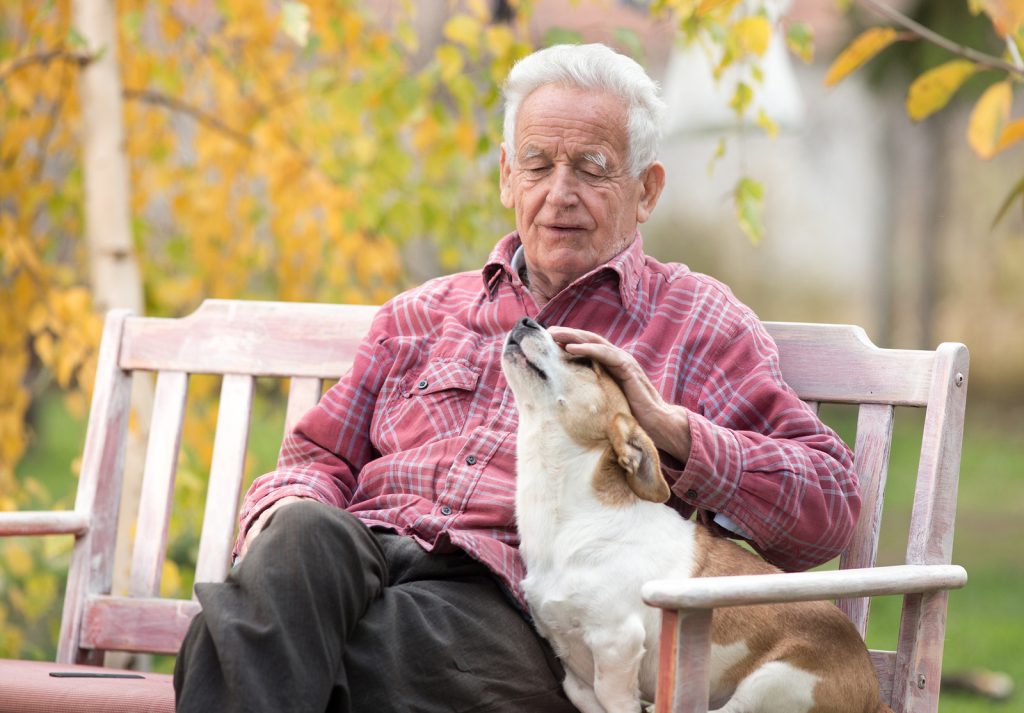
Pets aren’t just for the young and working.
In fact, having a four-legged or winged companion can be one of the best things for our mental and physical health as we enter old age.
When strong ties to friends, family and community become strained by a change in location, retirement or illness, a sense of purpose and belonging becomes essential for seniors and those in home nursing or living at home alone.
Pets help us connect with others because they often force us to be social and outgoing while giving us a reason to get out of bed and the house – and sometimes just to care for something other than ourselves is enough. Pet ownership can also help lower blood pressure and reduce stress while encouraging physical and social activity, as well as reducing the feeling of isolation.
Moreover, there are so many different types of pets that figuring out which one is the best pet for the elderly may come across as a challenge.
So here’s the research and information you need to help decide if you or someone you know is ready to welcome a new pet into your home, and which pets would be best suited for you.
Table of Contents:
Health Benefits for Seniors Of Having a Pet
Depression and anxiety can kick in when we feel a lack of companionship, and changes in personal circumstances can often make us feel disconnected. So adopting a pet can be a great way for seniors at home or in aged care to keep active in body and mind.
And while there are hobbies and social groups which can help, sometimes in old age there can be barriers to entry such as location, finances and access issues.
So when the cost and other difficulties associated with having pets are factored in, the pros far outweigh the cons.
Tips on choosing the right pet
Finding the right pet for a senior involves matching lifestyle and access choices and identifying issues which may arise later down the track. Before rushing out to find a friend for yourself or someone you know, there are some questions which need to be answered beforehand. Such as:
- Which pets have they previously owned?
- Have they had pets at all?
- Are there any disabilities or limitations to consider?
- Would they prefer an emotional support animal with special training?
- What age pet would best suit the owner?
Perhaps a pet already with a few tricks up their sleeve would be of greater benefit than a kitten or puppy, as youngsters require intensive care during their first few months.
And if the animal is already a senior itself, there may be limitations and extra care needed to take care of the new pet.
This can become a problem if the senior is likely to have lengthy and regular doctor visits or perhaps overnight stays in hospital, as it can impact the animal’s well-being.
Price can also be an issue, as dogs and cats cost almost twice as much as fish or birds. But if the animal is healthy and not too big and demanding, the cost is generally not going to be an issue.
And of course, personality can be a big factor when it comes to picking a pet. Some the traits that make a good pet for seniors are that they are relaxed, extroverted and respond well to being handled.
So while it’s expected that both parties will soon adapt to each other’s needs, it’s wise to ask an employee at the shelter or breeder about each animal’s temperament and personality. That way both parties can choose their new best friend.
Top 5 Pets For Seniors

1. Dogs
Man’s best friend is often the first companion we think of when considering the best pet for older adults. That’s because they force us to focus on something other than pains, weaknesses or lost friends and on something living in the moment.
Dogs help everyone from active seniors who have found themselves in a new location away from long-term connections. But they also help seniors who leave the house less frequently or are in nursing care. For these reasons dogs can offer companionship and a reason for short trips out of the house, even if it’s just down the street.
A simple walk in the park or around the block can maintain connections with others and eliminate general preoccupations about ageing, while short bursts of exercise might also see seniors running into friends and acquaintances, or making new friends, along the way.
Adopting a dog can be a great and cost-effective way to find a furry friend who is experiencing loneliness themselves.
And since seniors can also be more attentive pet owners than their 9-5 counterparts, dogs going from unsure and often lonely circumstances find themselves suddenly in a match made in heaven.
2. Cats
You’re either a cat or a dog person. Well, that’s what they say, anyway. But for many if the attentiveness of a dog is likely to become too much or there are mobility issues involved, cats can be an equally fun and friendly companion for those in home nursing , aged care or living at home alone – or just seniors with a lot to do and busy schedules.
Cats are great at looking after themselves and vocalising what they want – and when.
A cat’s sense of independence may not be for everybody, but they can be a fine companion to have sitting around the house or who pops in occasionally for some food, a cuddle, nap or a chat, making them one of the best pets for the elderly.
3. Rabbits
Rabbits tend to look after themselves and are always up for some attention. They also can be put in pens to give their owners a choice over when and how long interactions go for.
That being said, the lifespan of a rabbit is between one-to-two years, so if you or a senior you know is looking for a more long-term companion, perhaps a different choice is best.
4. Fish
When costs and upkeep are at a minimum, fish can provide an easy to care for pet, especially for those with mobility issues. Fish also have personalities and are great to look at.
5. Birds
The same goes for birds in the fact that breed and upkeep should be kept to a minimum when looking to adopt or purchase a bird. Different breeds require varying levels of care, but nonetheless, they can bring a nice singing voice and something to look at into the home.
It’s a big decision to add another loved one into your home. But if you are ready to make the choice, adopting may be the best way forward.
Where you can adopt a pet in Sydney
For a full and comprehensive list of available pets in Sydney, visit:
RSPCA NSW at https://www.rspcansw.org.au/adopt/
Pet Rescue at https://www.petrescue.com.au/
Sydney Dogs and Cats Home: https://sydneydogsandcatshome.org/
Overall, adopting a pet is a proven way for seniors to stay active in both body and mind. The best pet for the elderly really depends on their situation and what they are capable of handling. After considering these factors, it can be a decision which brings a lot of light into the lives of both themselves and their newfound companion!
Want to know more about the benefits of pets for those in care? Find out more here.
References:
Ballinger, Barbara. (2022). The Healing Power of Pets for Seniors. Aging Care. https://www.agingcare.com/articles/benefits-of-elderly-owning-pets-113294.htm
Australian Seniors. (2017) Benefits of owning a pet for over 50s. Australian Seniors. https://www.seniors.com.au/pet-insurance/discover/seniors-benefit-owning-pets
Beyond Blue. (2022). Connections Matter. Beyond Blue. https://www.beyondblue.org.au/who-does-it-affect/older-people/connections-matter
PetBarn. (2015). What type of dog is best for the elderly? PetBarn. https://www.petbarn.com.au/petspot/dog/dog-breeds/what-type-of-dog-is-best-for-the-elderly/








